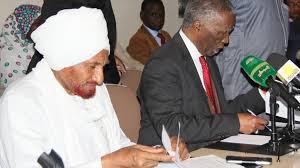
29th August, 2014
Memorandum to H.E. T. Mbeki (Chairman of AUHIP)
And Honorable Members of the Panel
INTRODUCTION:
We highly appreciate your tireless effort to help the peoples of Sudan help themselves. After all the intensive and meaningful efforts to build peace, and achieve stability in the Sudan through democratic transformation in the country, the country is now suffering from numerous war fronts, and a deep polarization in the body politic of the country. The country is now held together by an iron fisted security institution which is working in contravention of the constitution at the centre, while several regions are suffering from tribal schisms, and the domination of autonomous warlords. A type of chaos which is so inviting to Daesh-type Islamic State (IS) security challenges.
- For some time the Khartoum regime has suffered from important cracks in its structure, namely, dissident designs by its top security person, then a coup d’état attempt by some of its trusted officers, then the regime’s mistaken economic policies led to the popular uprising of September 2013 which they suppressed by bloody means. Such happenings persuaded the leadership of the regime to opt for dialogue for reform.
The head of state visited me and together we issued a declaration: that the issues of governance, peacemaking and the constitution, are National and should be resolved by a national inclusive process from which nobody should be excluded, and that no party should be allowed to dominate.
On January 2014, the head of state declared an initiative for a National Dialogue. We endorsed that initiative heartily, but the regime indicated that their concept of dialogue was wrong; they insisted that it should be under NCP chairmanship. When their resort to the use of irregular troops for anti-insurrection purposes, who in the transition of the Janjaweed committed atrocities, was criticized, they silenced such justifiable criticism by arrests, such policies, persuaded us that the regime’s concept of dialogue was unacceptable. Since then the dialogue process has boiled down to a reunion of some of the old coup making cronies, the regime has aborted the dialogue process.
- The process of peace making in terms of the 2046 UN resolution has failed to takeoff because it failed to recognize new realities. Another peace making process is that of attempts to persuade the groups which rejected the DOHA agreement to join it. In the present circumstances, the three processes which the Khartoum regime displays as National Dialogue and peacemaking are defunct. They only help the regime in its public relations postures that they are engaged in national dialogue and in peace making while reality tells a different story.
- Reality is now defined by new factors, namely:
- Since 2012, the armed resistance groups of Sudan have coalesced into an SRF. Attempts to tear them apart have failed. You have done well to step towards reality and invited them for hearing.
- The regime’s resort to unruly irregular troops under the security apparatus, in contravention of the constitution is an indication of the regime’s failure. It is a tactic which in the past has gained the regime most of the 61 Security Council resolutions under chapter seven. This opportunism has further alienated the regime nationally, and internationally.
- That, along with other aspects, increased the regime’s international isolation so that the country is now under financial siege.
- The emergence of a sharp regional polarization, with the regime in the wrong camp.
- Impact of the Paris’ declarations of August 2014 is as follows:
- Had the regime had any national and international sense, they should have welcomed the declaration with open arms. But the regime leaders are past masters of missing opportunities, they did that when they turned down our recommendations in 2006 which would have achieved a comprehensive peace agreement in Darfur, they did that when they turned down the Nafi/Malik framework agreement in 2011 and they are doing so now. The new coalition of the Paris declaration now occupies the high moral and political ground.
- The declaration has resulted in a new balance of political power.
- Since the declaration, it gathered national, regional and international support. It gained powerful allies.
- Dear panelists, the regime is still talking about the dead dialogue, they say that they reject imported solutions, although it is they who have negotiated and signed all agreements outside the Sudan. Their talk about the issues being among the Sudanese citizens is deceptive because even outside the Sudan, the matter is between the Sudanese citizens. The role of the UN, AU, EU, and Arab League … etc. is as friendly facilitations not as alternative partners.
- The moment is decisive; the continuation of a lame duck dialogue process only helps the regime with a PR facade. The situation in Sudan requires a serious radical solution. We suggest that you insist upon a comprehensive CODESA model for the Sudan. Such a solution will constitute an historical break through and you will achieve the historic recognition to which you are entitled. We are prepared to work with you to help persuade any stakeholders who do not subscribe to this scenario.
The Paris’ declaration has made it possible for Sudan to move forward into comprehensive and just peace, and democratization. Please do not allow personal and short sighted considerations abort the Marsh of History.
ALSADIG ALMAHDI

